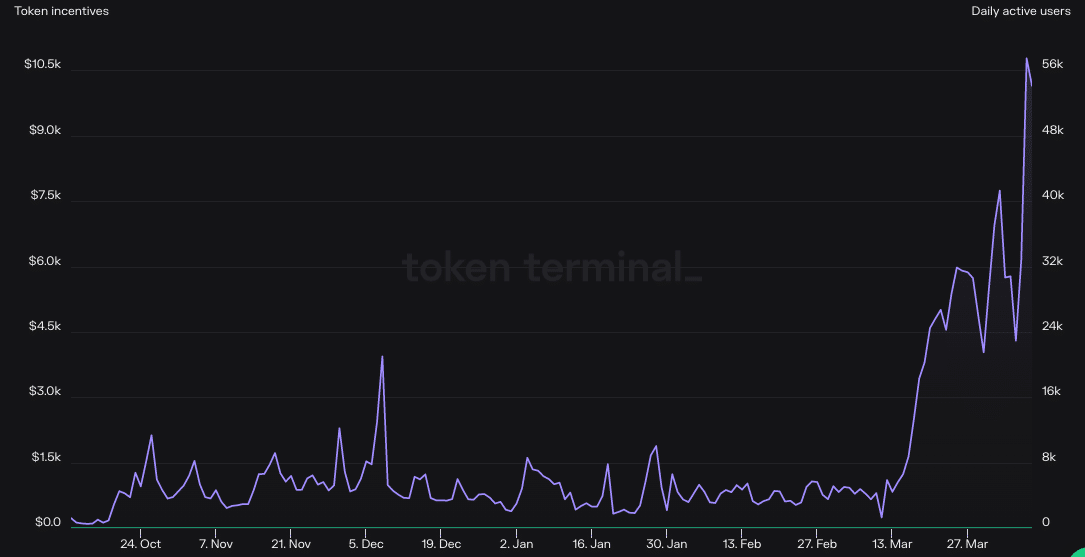Altcoin
StarkNet [STRK] activity bulges: Are traders bracing for a public launch
![StarkNet [STRK] activity bulges: Are traders bracing for a public launch](https://ambcrypto.com/wp-content/uploads/2023/04/po-2023-04-09T124155.645-1000x600.png)
- The number of active addresses on the StarkNet network increased by 1168% in the last 30 days.
- StarkNet foundation remained undecided on how to distribute rewards, but traders have positioned themselves.
Since StarkNet [STRK] deployed its token on the Ethereum [ETH] Mainnet, there has been an incredible amount of focus on the ecosystem. Although the tokens are not yet up for sale or public trading, contributions within the StarkNet network have been on a non-stop increase.
Realistic or not, here’s ETH’s market cap in ARB’s terms
According to Token Terminal, StarkNet’s active addresses were over 55,000 at press time. Active addresses represent the number of distinct users interacting with a project. This hike infers that the addresses had increased by 31.3% in the last seven days. And, in the last 30 days, this constituted a 1168.7% increase.
Taking steps toward the compensation for input
This rise implies that the crypto community views StarkNet as one of the most promising projects. Moreover, the buzz around the Ethereum scaling solution could also be connected to the distribution of a possible incentive by the StarkNet Foundation.
StarkNet prides itself on a platform that can significantly increase the speed and efficiency of transactions on the Ethereum network. Certainly, there are projects already engaged in this, like
Arbitrum [ARB] and Optimism [OP].But the focus is on StarkNet because many traders and investors are eagerly anticipating rewards for being early adopters like Arbitrum and Aptos [APT] did. In fact, a few weeks back, a lot of users engaged in bridging tokens on the StarkNet network less than 24 hours after the Arbitrum AirDrop. Hence, this hike means that the enthusiasm for the rewards remains high.
Although STRK would have a total supply of 10 billion, investors would only get 17%. Core contributors would get 32.9% while the foundation itself would be allocated 50.1%. However, the creators of the Zero-Knowledge (ZK) protocol have not yet confirmed what early adopters would get. But on 6 April, the first round of applications for incentives ended.
Applications for the 1st round of the Early Adopter Grants (EAG) program has ended!
The cut-off for last applications was at Wednesday, 5 April at 4PM GMT.
Thank you to the 104 projects that sent in their applications. Updates will be posted on the community forum soon! https://t.co/Pr3RpwO8Lo
— Starknet Foundation (@StarknetFndn) April 6, 2023
Vitalik in the StarkNet Cairo and Sierra cities
Another reason traders seem to be eyeing STRK’s public availability is Vitalik Buterin’s interest in the project. In its 8 April
Medium post, StarkNet revealed that its adoption of the Cairo 1.0 system was due to the Ethereum’s co-founder’s recommendation.Is your portfolio green? Check the Ethereum Profit Calculator
According to StarkNet, the Cairo assembly would help simplify smart contracts deployment on the network. Moreover, the addition of the Sierra language to Cairo 1.0 would ensure the safety of the scaling solution.
Before that, StarkNet had also explained how its solution would liberate Ethereum’s potential, thanks to its rollups. The blog post noted,
“As we embark on this grand voyage, rollups forge the path to a mightier, more secure, and decentralized Ethereum, elevating the platform without sacrificing its fundamental values.”


